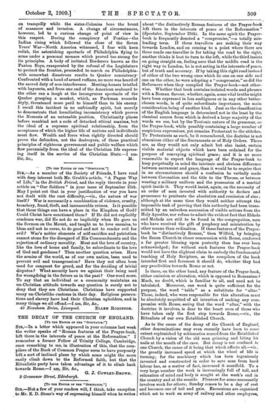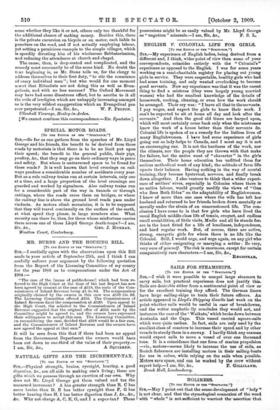[To THE EDITOR OF THE "SPECTATOR."]
S13,—Not a few of your readers will, I think, take exception - to Mr. E. D. Stone's way of expressing himself when he writes about "the distinctively Roman features of the Prayer-book left there in the interests of peace at the Reformation" (Spectator, September 25th). In the same spirit the Prayer- book is frequently denoted a " cornpromise,"—a totally mis- leading term. If three travellers are making their way towards London, and on coming to a point where there are three roads one traveller is for taking the road to the right, another thinks it best to turn to the left, while the third insists on going straight on, feeling sure that the middle road is the right way to London, he is not acting in the interests of peace, but of truth and accuracy. If by taking this right road instead of either of the two wrong ones which lie one on one side and one on the other, he were adopting a " compromise," so did the Reformers when they compiled the Prayer-book--not other- wise. Whether that book contains isolated words and phrases with a Roman flavour, whether, again, some vital truths might have been expressed in less ambiguous or in any other better- chosen words, is of quite subordinate importance, the main consideration being of another kind. Just as the classification of the English language is determined not in the least by the classical source from which is derived a large majority of the words we use, but by the Teutonic nature of its grammar, so the Prayer-book, while possibly containing a large number of suspicious expressions, yet remains Protestant to the stitches. To Protestants as such, be it remembered, the doctrine is not obnoxious either of the Sacraments or of Holy Orders. There are, as they would not only admit but also insist, certain visible material objects which have been ordained far the purpose of conveying spiritual grace; and it is no more reasonable to expect the language of the Prayer-book to keep perpetually in mind the intrinsic and obvious difference between sacrament and grace, than it would be to require that in no circumstances should a confusion be verbally made between Coronation and the title to the Throne, or between wearing a military uniform and the possession of a martial spirit inside it. They would insist, again, on the necessity of an order of men invested with authority to declare and pronounce to penitents the absolution and remission of Bins; although at the same time they would neither attempt the impossible task of proving that this authority had been trans- mitted by an unbroken succession of visible actions from the Holy Apostles, nor refuse to admit the evident fact that Eldade and Medade are still to be found in the congregation, men who have received the gift of prophecy and ministration by other means than ordination. If these features of the Prayer. book be "distinctively Roman," then Wilfrid, by bringing the Saxon Church in closer communion with Rome, conferred a far greater blessing upon posterity than has ever been acknowledged ; for without such features the Prayer-book would not have the slightest claim to embody the fundamental teaching of Holy Scripture, as the compilers of the book intended first and foremost it should do, whether: they had any proclivities towards Rome or not.
Is there, on the other hand, any feature of the Prayer-book, either omission or alteration, which is opposed to Romanism ? Much, no doubt, which is familiar to all, and need not be tabulated. Moreover, one word is quite sufficient for the purpose, the word " table " as a substitute for "altar." Those, indeed, who were responsible for this alteration must be absolutely acquitted of all intention of making any com- promise with Rome, seeing that the word "altar," with the doctrine it involves, is dear to the heart even of those who have taken only the first step towards Rome,—viz., the Ritualists of our own Established Church.
As to the cause of the decay of the Church of England, other denominations may even recently have been to some extent replenished by schismatics scared from the Established Church by a vision of the old man grinning and biting his nails at the mouth of the cave. But decay is not confined te one Church, the cause of it being that which affects all,—viz., the greatly increased speed at which the wheel of life is turning; for the machinery which has been ingeniously invented and constructed in order to save man from hard labour has, as a matter of fact, increased it manifold. To a very large number the week is increasingly full of toil, and relaxation of mind and body is sought at the week's end in the country and at the seaside. Pleasure for some necessarily involves work for others ; Sunday ceases to be a day of rest and becomes one of toil and gain. Excursions are organised which set to work an army of railway and other employees,
some whether they like it or not, others only too thankful for the additional chance of making money. Besides this, there is the private excursion on bicycle or on motor, each liable to puncture on the road, and if not actually employing labour, yet setting a pernicious example to the simple villager, which is speedily divesting him of his wholesome Sabbatarianism, and reducing the attendance at church and chapel.
The cause, then, is deep-seated and complicated, and the remedy must necessarily be of the same kind. No doubt the tine beginning is, as Mr. Stone tells us, for the clergy to address themselves to their first duty, "to stir the conscience of every individual man"; but who would for one moment assert that Ritualists are not doing this as well as Evan- gelicals, and with no less success? The Oxford Movement may have had some disastrous effect, but to ascribe to it all the evils of irreligion which are unhappily increasing amongst us is the very wildest exaggeration which an Evangelical pen
ever perpetrated.—I am, Sir, &e., W. F. PELTON. Ulle-akall Vicarage, Henley-in-Arden.
[We cannot continue this correspondence.—En. Spectator.]



























































 Previous page
Previous page